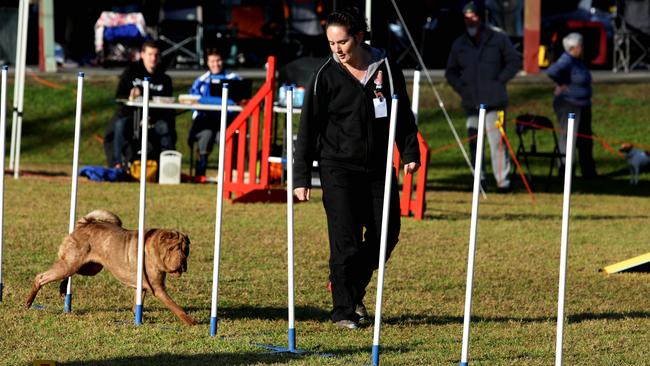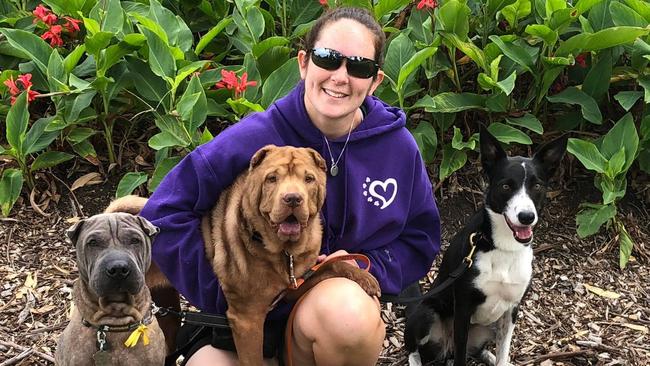Qantas change for assistance animals on board after being sued for disability discrimination
Qantas has updated its requirements for assistance animals on flights after being sued for disability discrimination by a woman whose dog was not allowed on board.
A woman who sued Qantas for disability discrimination when the airline refused to allow her assistance dog on board has settled her case in what her lawyers say is a win for travellers with assistance animals.
Rachael Fullerton was told by Qantas in 2022 that her dog Strike did not meet its certification standards to travel on a domestic flight.
Although Strike was registered with the New South Wales Pet Registry as an assistance dog and had completed temperament and public access tests, he was not certified under the Guide, Hearing and Assistance Dogs Act, nor was he trained by a full member of Assistance Dogs International.
However, Strike had been approved for travel with Ms Fullerton on Virgin Australia and Rex, adding to her distress and confusion.
Lawyers Maurice Blackburn and the Justice and Equity Centre argued that Qantas’ requirements went well beyond what the federal Disability Discrimination Act sought in terms of training and qualifications for assistance animals.
Ms Fullerton filed her case in the Federal Court in October 2023, prompting Qantas to update its application process for assistance dogs to provide people with more information about what was needed to bring a service dog on board.

She said the changes were “long overdue and would ultimately make a huge difference to the accessibility of air travel for people like herself”.
“It’s inconceivable that people with disabilities are still facing so many barriers to service, but hopefully this will set a precedent for improved disability standards and better practices from many businesses moving forwards,” said Ms Fullerton.
“It’s been a very long process to get to this point, but the outcome has definitely proven that it’s been worth it.”
Senior associate at Maurice Blackburn Bridie Murphy said it had taken more than two years and a substantial legal fight for Ms Fullerton to win the right to travel with Strike on Qantas.
“The barriers to travel for people with disability are high enough,” said Ms Murphy.
“The few airlines people have access to in Australia should not be making this worse by setting up their own rules that make the process even more complicated and inaccessible.”

Senior solicitor with the Justice and Equity Centre Sheetal Balakrishnan said cases like Ms Fullerton’s showed why an aviation disability standard with proactive enforcement was essential to ensure people with a disability had equal access to air travel.
“People with disability should be able to expect fair and consistent treatment no matter which airline they fly with or which airport they fly to,” said Ms Balakrishnan.
“A comprehensive and enforceable national standard can set out rights for people with disability when travelling by air and require all operators to improve accessibility, so it’s not luck of the draw.”
Details of the settlement were confidential.
A Qantas spokeswoman said the minimum standards required for service dogs had not changed and safety remained their first priority.
“In terms of our application and permission process, we have updated our ‘more information form’ which now provides further guidance to customers about the information and documentation that can be provided to Qantas when making an application to travel with a service dog in the aircraft cabin,” sid the spokeswoman.
“This helps Qantas to assess whether the dog meets the minimum safety standards in our criteria for carriage.”
A Qantas spokeswoman said Ms Fullerton had provided additional information and they were satisfied Strike met their requirements.
“We’re pleased to have resolved this matter and we look forward to welcoming Strike onboard in the future,” she said.
Qantas and Jetstar remain opposed to allowing pets on planes following regulation changes by the Civil Aviation Safety Authority making it possible to carry dogs and cats in the cabin.
Virgin Australia is planning to permit small dogs and cats on board next year, providing they can fit in a carrier under the seat in front in selected rows.
Melbourne-Sydney was expected to be the first route for Virgin’s pets on planes policy, likely to mirror that of US partner United Airlines.






To join the conversation, please log in. Don't have an account? Register
Join the conversation, you are commenting as Logout